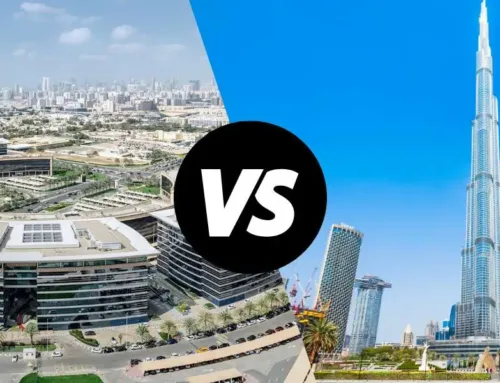Dubai’s freezones are designed to attract global investors and entrepreneurs by offering 100% foreign ownership, tax exemptions, and streamlined business setup processes. Whether you’re a startup, freelancer, or established company, setting up a company in a Dubai freezone is one of the most efficient ways to establish a presence in the UAE.
This article provides a step-by-step guide to setting up a company in Dubai freezones, covering licenses, office requirements, visa options, and key considerations.
Why Set Up a Company in a Freezone?
Dubai freezones provide several advantages:
- 100% Foreign Ownership – No local partner required.
- Tax Benefits – Corporate tax exemptions for a specified period.
- Easy Business Setup – Minimal paperwork and fast licensing.
- Visa Options – Sponsor yourself and employees.
- Sector-Specific Freezones – Tailored facilities for IT, media, trading, and e-commerce.
- Professional Business Environment – Access to office space, banking, and networking opportunities.
These benefits make freezones ideal for entrepreneurs who want to start, scale, and operate efficiently in Dubai.
Step 1: Choose Your Freezone
Dubai has over 30 freezones, each specializing in different sectors:
- Media City – Media, advertising, and creative industries
- Internet City – IT, technology, and digital services
- CommerCity – E-commerce businesses and online retail
- Jebel Ali Freezone (JAFZA) – Trading, logistics, and industrial operations
- Dubai Silicon Oasis (DSO) – Tech startups and software companies
Tip: Select a freezone that aligns with your business activity, visa requirements, and budget.
Step 2: Determine Your Business Activity
Freezones offer different licenses depending on your business activity:
- Trading License – For import/export and product trading
- Service/Professional License – For consulting, IT, marketing, and freelancers
- Industrial/Manufacturing License – For production, assembly, and industrial operations
- E-Commerce License – For online businesses and marketplaces
- Freelance License – For individual professionals
Your license determines what your company can legally do in Dubai and abroad.
Step 3: Decide on a Legal Structure
Freezone companies have specific legal structures, including:
- Freezone Limited Liability Company (FZ-LLC) – Suitable for trading and service companies
- Branch of a Foreign Company – Allows an existing foreign company to operate in Dubai
- Freelance/Individual License – For independent professionals and consultants
- Holding Company – For investment and asset management
Tip: Choose a structure that matches your business scale and future expansion plans.
Step 4: Choose Your Office Space
Most freezones require a physical or flexi-office to issue a license:
- Flexi-Desk / Virtual Office – Cost-effective, suitable for startups and freelancers
- Dedicated Office – Required for larger teams and companies needing more visas
- Warehouse / Industrial Unit – For trading and manufacturing businesses
Office type affects your visa quota, cost, and license eligibility.
Step 5: Submit Required Documents
The documents typically required for company registration include:
- Passport copies of shareholders and directors
- UAE entry permit or visa (if applicable)
- Proof of residence (for visa applicants)
- Business plan (for some freezones)
- MOA/AOA (Memorandum of Association / Articles of Association)
- Application form from the chosen freezone
Tip: Ensure all documents are valid, attested if required, and complete to avoid delays.
Step 6: License Application and Approval
Once documents are submitted, the freezone authority will review your application:
- Verification of business activity and compliance
- Approval of office space and license type
- Issuance of initial approval certificate
Processing Time: Usually 3–7 working days, depending on the freezone and type of license.
Step 7: Pay Fees
License and registration fees vary based on:
- Freezone selected
- Type of license (trading, service, industrial, freelance)
- Office space required
- Visa package included
Typical Cost Range:
- Freelance/Service License: AED 7,000 – 12,000
- Trading/Industrial License: AED 12,000 – 20,000
- E-Commerce License: AED 14,000 – 20,000
Step 8: Visa and Immigration Process
After license approval, you can apply for residence visas for yourself and employees:
- Investor / Owner Visa – For company shareholders
- Employment Visa – For employees working in the freezone company
- Dependent Visa – For family members
Process:
- Entry permit issuance
- Medical test (blood test and X-ray)
- Emirates ID application
- Visa stamping in passport
Duration: Approximately 2–3 weeks from license issuance to visa stamping.
Step 9: Open a Corporate Bank Account
A corporate bank account is essential for:
- Receiving client payments
- Paying suppliers and employees
- Managing VAT and accounting
- Enhancing business credibility
Banks may require:
- Freezone license
- Shareholder passports and visas
- Proof of office and business activity
- Business plan and expected turnover
Step 10: Start Operations
After completing license, office, visa, and bank setup, your Dubai freezone company is ready to operate. You can now:
- Start trading or providing services
- Hire employees and sponsor visas
- Open online stores or marketplaces
- Expand your business locally and internationally
Tips for a Smooth Setup
- Choose the right freezone based on industry and future goals
- Plan your visa and office requirements early
- Prepare complete and accurate documentation
- Understand the fee structure and budget accordingly
- Work with a consultant if you’re new to Dubai business setup
Final Thoughts
Setting up a company in a Dubai freezone is a structured and efficient process if you follow the right steps. By carefully choosing your freezone, license type, office setup, and visa plan, you can establish a fully compliant and operational business in Dubai.
Freezones provide a business-friendly environment with flexibility, 100% ownership, and global connectivity, making Dubai one of the top destinations for entrepreneurs and international businesses.



